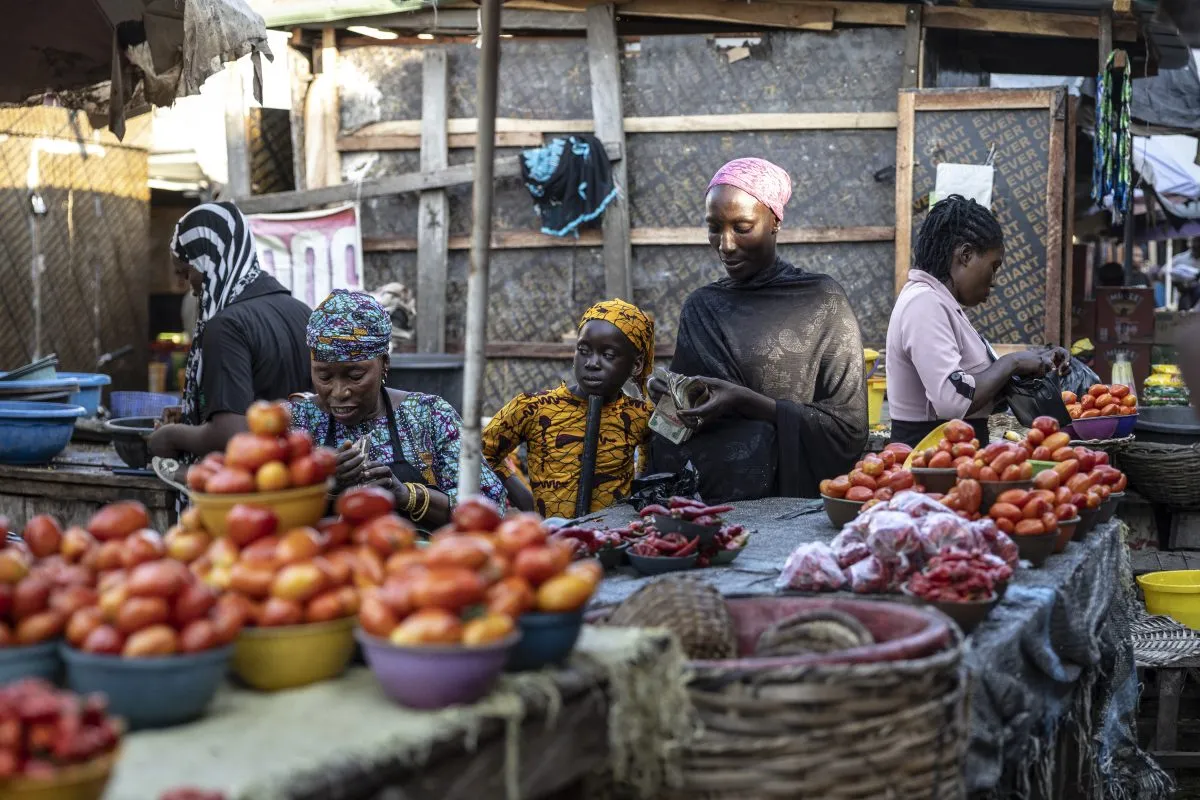Nigeria’s inflation rate surged for the third consecutive month in November to reach 34.6%, the highest level in over 28 years, according to data from the statistics agency.
The inflation has been exacerbated by recent floods in the country’s northern regions, which have caused prices of staple foods such as yam, corn, and rice to soar. Rising gasoline costs have also contributed to the price pressures in Africa’s largest crude oil exporter.
Inflation surged sharply in the latter half of 2023 following President Bola Tinubu’s decisions to allow the naira to devalue and to cut fuel subsidies in a bid to boost economic growth and stabilise public finances. Since the beginning of the year, the naira has depreciated by 42% against the dollar, resulting in increased importation costs for fuel and other commodities.
Tight monetary policy
Elevated inflation raises the prospect that the Central Bank of Nigeria will continue its monetary tightening policy, which has seen the benchmark interest rate climb from 18.75% at the end of 2023 to 27.5% this year. Last month, Governor Olayemi Cardoso said the Monetary Policy Committee expects inflation to start easing in 2025 because of these measures.
Yvonne Mhango, Africa economist at Bloomberg Economics, says that she sees a path to reduced inflation next year.
“After the higher-than-expected rise in Nigeria’s inflation, we now expect price gains to moderate from January – rather than December – at a slow pace. Rate hikes will persist until the Central Bank of Nigeria achieves its goal of restoring positive real rates – likely in the third quarter of 2025. Falling inflation will give scope for policy to become less restrictive in 4Q25.”
Churchill Ogutu, an economist at asset manager IC Group, tells African Business that, though the higher interest rates will ultimately bring down prices, it may take some time before this comes to pass.
“Monetary policy works with some significant lags and we are yet to see the cumulative effect of the 875 bps hike filtering through the inflation outturn. Furthermore, Nigeria’s inflation has stemmed from the weaker naira which has weighed heavily on imported food inflation.”
Need to stick to reform agenda
With inflation at the highest in decades and the naira slumping to record lows, concerns over whether Nigeria can turn the corner continue to mount. Ogutu believes that it can, but that it will have to sustain the economic reforms initiated by President Tinubu.
“Nigeria can muddle through if it sustains its reform agenda, only that there has been short-term pain which should pave the way for longer-term gain,” he says.
He argues that a strong focus should be placed on revenue mobilisation to stabilise the economy.
“On the fiscal side, we like that Nigeria is reforming its VAT system with an aim of doubling the VAT rate from the current 7.5% to 15% by 2030, which should help in revenue mobilisation.”
“Recently, Nigeria floated a dual-tranche $2.2bn Eurobond at premium yields compared to South Africa, which went to the market two weeks earlier, highlighting the fiscal strains Nigeria is facing. So revenue mobilisation should be a priority, as it continues its reform agenda.”
Ndiame Diop, World Bank country director for Nigeria, also holds the view that efforts to boost revenue should be sustained. However, he maintains that this should be coupled with support for vulnerable households most adversely affected by the loss in purchasing power.
“Going forward, it will be important to consolidate the improving fiscal outlook and scale up the support for the poorest households to cope with purchasing power losses and hardships, while expanding opportunities for growth and productive jobs,” he notes.
Want to continue reading? Subscribe today.
You've read all your free articles for this month! Subscribe now to enjoy full access to our content.
Digital Monthly
£8.00 / month
Receive full unlimited access to our articles, opinions, podcasts and more.
Digital Yearly
£70.00 / year
Our best value offer - save £26 and gain access to all of our digital content for an entire year!

 Sign in with Google
Sign in with Google 



